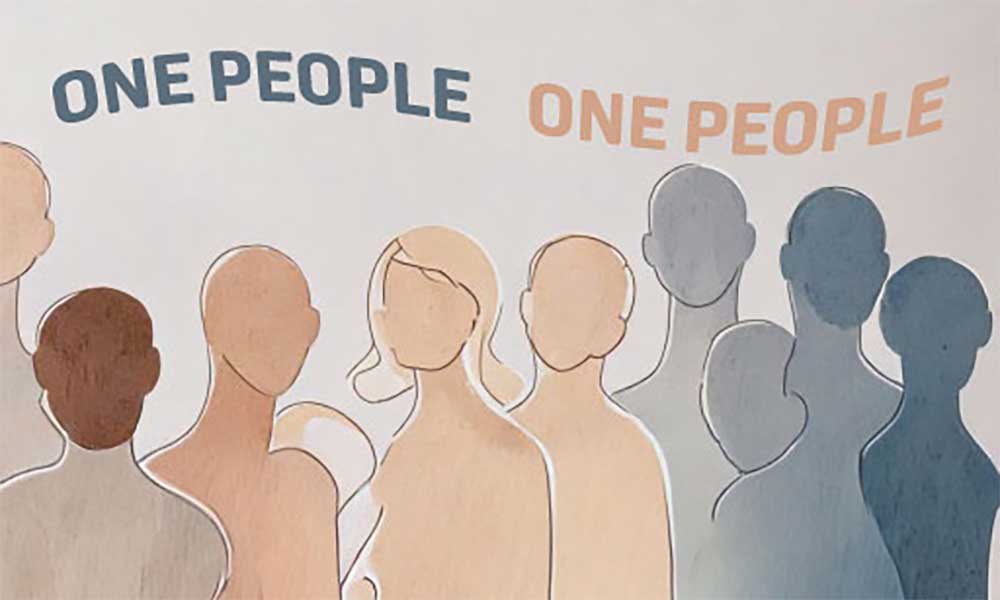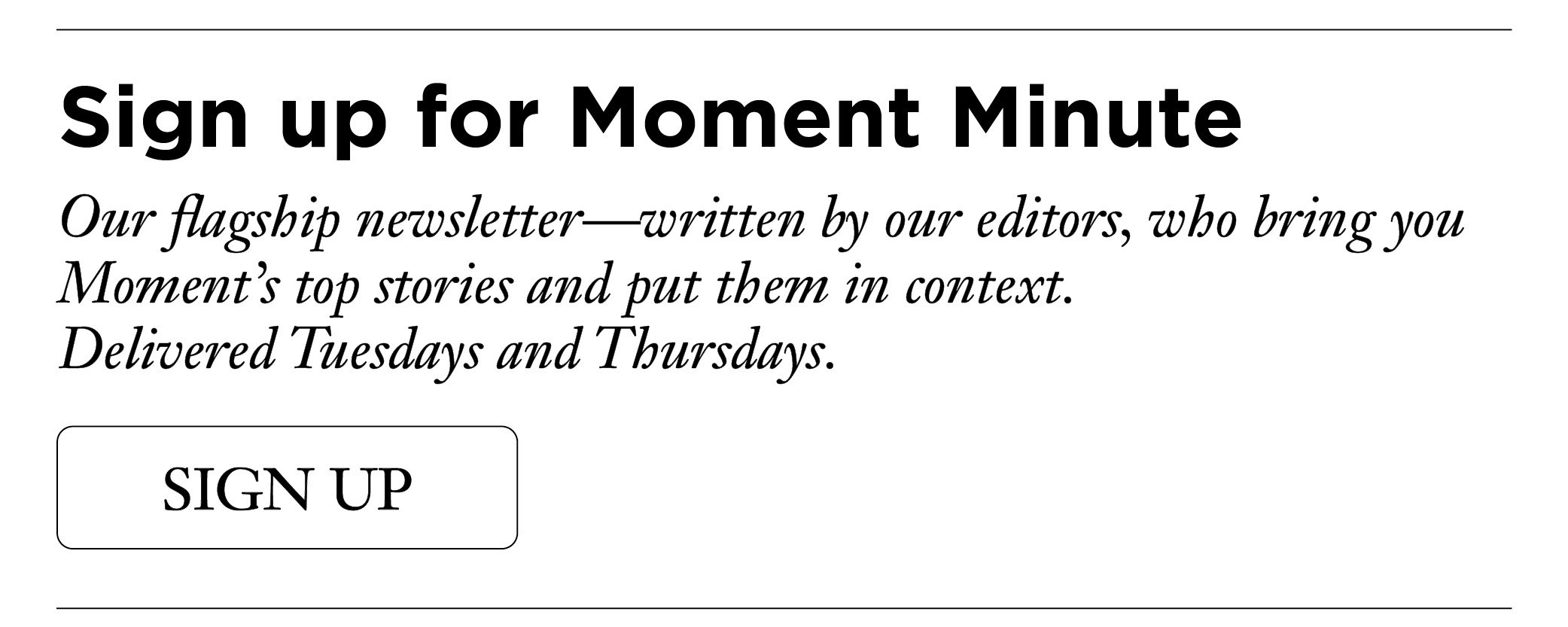Interviews by Amy E. Schwartz
DEBATERS
Matthew Nouriel is the community engagement director for Jews Indigenous to the Middle East and North Africa (JIMENA).
Rabbi Amichai Lau-Lavie, ordained at the Jewish Theological Seminary of America, is the founding spiritual leader of Lab/Shul in New York City and subject of the 2024 documentary Sabbath Queen.
INTERVIEW WITH MATTHEW NOURIEL
Are the Jews One People? | Yes
Are the Jews one people?
Yes. Historically, we were a group of tribes that merged into peoplehood, then got splattered all over the world due to expulsion and diaspora. That’s how we always were, and that’s how we are now. People focus on differences created in diaspora, but at the end of the day, we and our culture all come from the same place. And we’ve been mostly successful in diaspora, rather miraculously, at remaining one people.
At JIMENA (Jews Indigenous to the Middle East and North Africa) I work on behalf of the history, heritage and rights of the one million Jewish refugees from the Middle East and North Africa and their descendants. I want those histories to be seen as a seamless part of Jewish history, not on the periphery. My history is yours, and yours is mine. I’m from the Iranian Jewish diaspora, but I went to Jewish day school in London, and when we learned about the Holocaust and the Russian pogroms, I never questioned my connection to those histories. Yet somehow, histories of Jewish diaspora communities outside Europe are looked at as something “other.” They shouldn’t be.
Have there been times of greater unity than today?
You could call it a silver lining of October 7 that it sparked an incredible sense of unity. So many people came together, regardless of their backgrounds, observance levels or politics. And many who were not involved with their Jewish identity were suddenly alert and awake to it. Lately there’s been more division again, and I’m disheartened to see it.
My history is yours, and yours is mine.
Paradoxically, individual diaspora communities over the past 2,000 years probably felt more unified, or at least more homogeneous, than now. I have a friend, an Ethiopian Jew, whose mother was shocked when she first got to Israel—she didn’t know there were white Jews! Jews in Ethiopia had lived isolated for centuries with no idea there were other communities that were different. Likewise, in Iran, there were probably smaller-scale “unified” communities like the Jews of Tehran and the Jews of Isfahan. And then all these communities had to leave their diasporic homes and reunify. Maybe we’re experiencing a form of growing pains. Having to come back together isn’t easy.
Will today’s political disagreements tear Jewish life apart?
As we saw after October 7, when push comes to shove, we do get unified. But the sooner we stop obsessively aligning ourselves with American politics in the sense of being a Republican first and then a Jew, or being a Democrat first and then a Jew, the better. I’ve always been a very liberal-minded person, and I started to realize in recent years that perhaps things won’t always go the way I want within the party that I affiliate with. Because of that, in the name of Jewish unity, I’ve tried very hard not to judge people who come from a different political stance. Those disputes won’t serve us in the long run. All we have is each other.
What about the Jewish value of reasoned disagreement?
By unity, I don’t mean we all have to agree with everyone on everything. That’s not humanly possible. And I wouldn’t trust anyone who’s agreeable to everything. But we have to make sure that those disagreements stay reasoned. That’s a tradition of our peoplehood that’s been passed down, not just culturally but religiously as well. That said, I think we all have our red lines.
Does anything justify ruling somebody out of the Jewish people?
I have a very difficult time with the so-called “anti-Zionist Jews.” I don’t think they should be permanently excommunicated, but I don’t know how they fit into Jewish life. I was taught that Jewish peoplehood precedes the modern state, that we’re a nation and a people. Anti-Zionism, to be clear, doesn’t mean anti-Israeli policy or anti-Israeli government, or even antiwar. There’s something very self-loathing about it. Many people draw the parallel to the small number of Jews who were pro-Nazi leading up to World War II.
What, if anything, binds us together?
As the Israeli activist Rudy Rochman puts it, Judaism after the Jews’ expulsion from Rome became a portable suitcase so we could take our identity with us everywhere we go. I truly believe that’s how we’ve maintained our peoplehood. I’m not a very religious person, although I appreciate our religion for how it binds us together. But also, our history is fascinating and unique. There’s no reason we should have been able to come back together in our homeland. So many other Indigenous religious groups or ethnic groups from the Middle East to North Africa—which is what we are, despite what anybody says—are gone or are tiny, tiny minorities, like the Zoroastrians of ancient Persia. There’s no reason for any of this to have survived.
INTERVIEW WITH RABBI AMICHAI LAU-LAVIE
Are the Jews One People? | No
Are the Jews one people?
No. But it’s a complicated question, and there’s nuance. Our biblical origin story suggests that we were born divided—and are on a perpetual quest to find common ground. The Hebrew Bible is a mosaic of two opposing narratives, describing two ideologically opposed systems within the Jewish people—the kingdoms of Israel and Judah, the North and the South kingdoms, an outward-looking pluralist culture that refers to God as “Elohim” and a monotheist, inward-looking one that uses the name Yahweh (“Jehovah”). Scholars call these the E and J narratives, and although the southern kingdom “won”—the book was transcribed by the South and emphasized southern ideas—the schism has played out throughout our history, with fascinating, often heartbreaking variations.
We’re seeing that schism right now. It’s a particularist versus a universalist Judaism, an either-or attitude versus a both-and, a right-wing fundamentalist view of Judaism against a more open, pluralist approach. The conflict can be seen in everything from intermarriage to how we deal with Israel-Palestine.
Have there been times of greater unity than today?
I think unity remains aspirational. The Bible describes beautiful moments when those two kingdoms would come together. King Hezekiah held a famous Passover Seder in the 8th century BCE after the destruction of the northern kingdom, inviting all the refugees. In the 16th century, Sephardi and Ashkenazi thinkers together created the Shulchan Aruch with additional commentary, a definitive compilation of Jewish law to this day. Israel itself is an experiment, trying to be a place of many narratives, not just one.
Will today’s political disagreements tear Jewish life apart?
You mean, even further? My modern American liberal Jewish life has very little to do with that of my Haredi cousins. Our Sabbath looks different, our Yom Kippur looks different, we think differently about how we vote and what we eat. Same with my cousins who are settlers in the West Bank or my secular family in Los Angeles. Will we soon not recognize each other as legitimately Jewish? That’s happening already in some circles, and it could get worse.
Our biblical origin story suggests that we were born divided.
But Jewish life is a constant response to rupture and trauma. Rabbinic Judaism evolved out of the rubble and ruin of the Roman Empire and the Second Temple. Zionism was born out of the collapse of the Ottoman and European empires. It’s always these ruptures that create something new.
What about the Jewish value of reasoned disagreement?
It’s easier to have civil disputation when you’re living in the minority in Babylon or Berlin. We’re now back in a position where Jews do have power, and Judah versus Israel is being played out again. Is the land Jewish-only, or is it Jewish-and-other? Some of these debates right now are debased and ugly and violent, though some are handled with respect.
We’ve been wrestling with who we are for thousands of years, ancient voices propelled into ongoing dialogue. This liberal voice that I’m evoking, pro-human rights and queer rights and women’s rights and human liberty, is not a modernist trope. It’s been here from the very beginning, as an alternative voice that says the divine is everywhere, not centralized only in Jerusalem. This polydoxy is part of our legacy, and it’s legitimate.
Does anything justify ruling somebody out of the Jewish people?
That’s a really hard question. I understand why the elders of Amsterdam excommunicated Baruch Spinoza for heresy—it’s how they preserved the religious and cultural norms of their community—but I wouldn’t do it. What about a supremacist, racist Jew—I won’t name names—who’s doing things in my name that make my blood boil? Nope. What about those people who claim Israel is a total abomination and yet love Yiddish and want to do a Seder? Still no. What about Jeffrey Epstein? In the Talmud, it says, “A Jew who has transgressed is still a Jew.” On the other hand, can we handle a tent big enough to hold these polarities, knowing that in history that didn’t work out, and the fanatics burned Jerusalem?
What, if anything, binds us together?
We share traumas and we share treasures. We share pain—that’s almost the definition of solidarity, that it hurts me when you’re hurting. We share responsibility—and despite the radical edges, we share a deep investment, or at least a hope, that this Jewish project will continue to grow and evolve. Tikkun olam isn’t some modern idea: The core of our theology is that we evolve, God evolves, reality evolves for the better. I want to believe that we all believe that.



